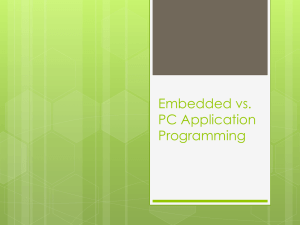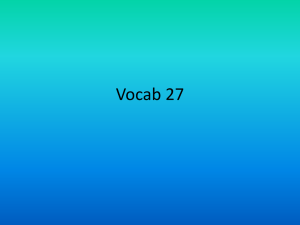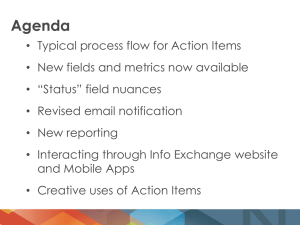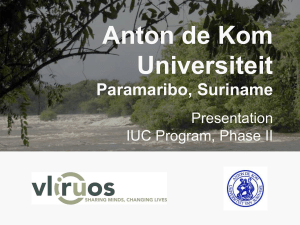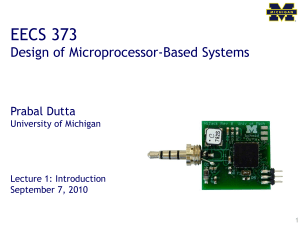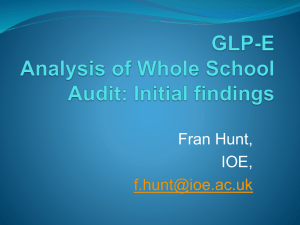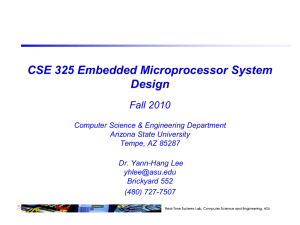PPT - ECE 751 Embedded Computing Systems
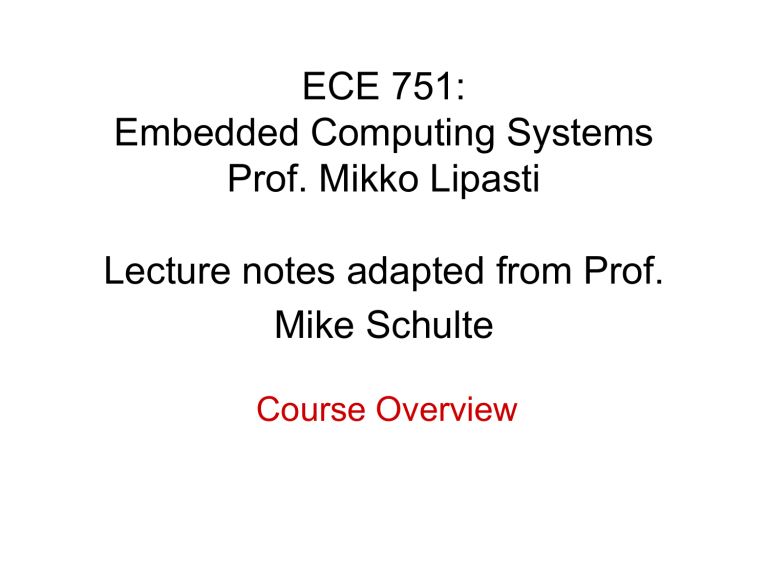
ECE 751:
Embedded Computing Systems
Prof. Mikko Lipasti
Lecture notes adapted from Prof.
Mike Schulte
Course Overview
Class Details
Class Times: 9:30 AM to 10:45 am on T, R in 3534 ENGR HALL
Instructor: Prof. Mikko Lipasti, 4613 ENGR HALL, 265-2639 mikko @engr.wisc.edu
Office Hours: 9:00-12:00 W or by appointment
Office hours may change; semester schedule still in flux
Website: http://ece751.ece.wisc.edu
Credits: 3 Section: 1
Prerequisites: ECE/CS 552 (Introduction to Computer Architecture)
Goals
• The course goals to provide students with:
– An understanding of compiler and run-time software for embedded systems.
– An opportunity to research embedded computing systems through a class project and presentation.
Course Description
• Examines recent research in high-performance embedded computing systems
– Emphasis on embedded processor architectures and microarchitectures
– Also covers embedded system design and simulation, embedded compilers and tool chains, run-time systems, and application design
• Places a large emphasis on
– Reading and discussing research papers and textbook material
– Working through practical examples
• Homework and a course project used to help you put the ideas from the course into practice
Course Textbook and Tools
• Wayne Wolf, High-Performance Embedded Computing ,
Morgan Kaufman Publishers, Elsevier, 2007.
• Textbook Website: http://www.waynewolf.us/hiperf-book/
• Useful reference texts include
– Joseph A. Fisher, Paolo Faraboshi, and Cliff Young, Embedded
Computing: A VLIW Approach to Architecture, Compilers and
Tools , Morgan Kaufman Publishers, Elsevier, 2005
– Wayne Wolf , Computers as Components: Principles of
Embedded Computing System Design , 2nd Edition, Morgan
Kaufman Publishers, 2005.
– John L. Hennessy and David A. Patterson , Computer
Architecture: A Quantitative Approach , 4th Edition, Morgan
Kaufmann Publishers, 2006.
Course Research Papers
• About 15 research papers will be assigned
– Typically one per week
– Available from the course website
– Read before coming to class & be ready to discuss
– Review due dates will be posted on course website: typically the night before scheduled class discussion
– Reviews must be uploaded to learn@uw dropbox
– May not match up with material being covered in the textbook
Course Grading [1]
Homework and Quizzes:
Midterm:
Final:
Project:
20%
25%
25%
30%
1
2
3
4
5
6
7
Tentative Course Schedule [1]
Week Dates Assignments/
Comments
Topics Readings
9/4, 9/6
9/11, 9/13
9/18, 9/20
9/25, 9/27
10/2, 10/4
10/9, 10/11
10/16, 10/18
Introduction
Embedded Processors
Embedded Processors
Embedded Software
Ch. 1 [1,2]
Ch. 2.1-2.5 [3,4]
Ch. 2.6-2.10 [5,6]
Ch. 3.1-3.3 [7,8]
Embedded Software Ch. 3.4-3.6 [9]
Embedded Processes &
Scheduling
Midterm 1 in class on 10/16
Embedded Operating Systems
Ch. 4.1-4.3 [10]
Ch. 4.4-4.6
Course Schedule [2]
Week Dates Assignments/
Comments
Topics Readings
9 10/30, 11/1
10 11/6, 11/8
N/A 11/13, 11/15
11 11/20
Embedded Multiprocessors
Multiprocessor Software
Multiprocessor Software
Ch. 5.6-5.10 [13]
Ch. 6.1-6.3
Ch. 6.4-6.6
15 Tue 12/18
Project progress Hardware/Software Co-Design Ch. 7.1-7.3
report due 11/20
12 11/27, 11/29
13 12/4, 12/6
14 12/11, 12/13 Final project reports due
12/14
Hardware/Software Co-Design Ch. 7.4-7.6
Embedded accelerators [14,15,16]
Project talks
Course Evaluation
Midterm 2 Review
Midterm 2 12:25-2:25pm
Lectures, Homework, Quizzes
• It is important to attend each lecture
– Lots of the material covered in lecture is not in the book or readings
• There will be several homework assignments
– Not all will be collected/graded
– May require use of C/C++ and Unix
– Due at start of class
– Late homework not accepted
• There will be unannounced in-class quizzes
– Lowest score dropped to accommodate occasional absence
Project [1]
• For the course project, you will be expected to complete original work related to embedded systems in teams of three or four students.
• Projects will consist of a proposal, status report, final report, and short presentation.
• You are encouraged to come up with your own topic for the project, but will be provided with a list of possible ideas.
• Projects can consist of an in-depth survey, original research, and/or hardware or software development related to embedded systems.
Project [2]
• The class project counts for 30% of the overall grade.
• Students will be expected to turn in a summary of the contribution to the project to facilitate fair grading to individual team members.
• Additional details on the course projects will be provided in a separate document.
Other Items
• Plagiarism: using someone else’s ideas, words, figures without proper acknowledgement
– Is illegal and not allowed in this class
– Be sure to phrase statements in your own words and cite appropriate references directly in the text
– Failure to do so will result in severe grading penalties
• Communication:
– Questions and comments during class are encouraged
– I encourage you to meet with me during office hours
– I will frequently email the class
– When sending email include ECE751 in subject
Next Steps
• Visit course website ece751.ece.wisc.edu
• Read over Chapter 1 in textbook
• Complete HW#1, posted on website
• Read over first two
papers (no reviews)
[1] T. Austin, D. Blaauw, S. Mahlke, T. Mudge, “Mobile
Supercomputers,” IEEE Computer, vol. 37, no. 5, pp 81-83.
[2]P. Kocher, R. Lee, G. McGraw, A. Raghunathan, S. Ravi,
“Security as New Dimension in Embedded System Design,”
DAC 2004.
• Course website has lot of material with copyrights – do not post or distribute
